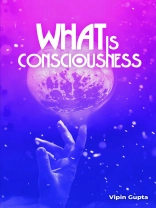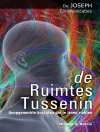What Is Consciousness: The Factor Creating the Law of Limitation is an eye-opening investigation of how what we know limits our power to know the unknown.
Have you ever wondered why some people know what you do not? Why you have to read books, research an issue, practice a project, or scientifically study a subject to know something that some can explain spontaneously using intuitive reasoning? For instance, you may have waited to watch others’ experiences before deciding to take precautions to protect your kin and kith from COVID-19. Until those became martyrs, you were willing to put your wellness to the hands of a tiny virus you thought had virtually no existence. Why did we not know that a virus has the potential to cause an infectious, morbid, and deadly global pandemic in a globally connected world, bringing even the wealthiest of nations to a standstill? Was it because such an eventuality was not knowable through the systems of knowing we had, such as the scientific knowledge? Or did we create the uncertainty due to the certainty we felt in our supernatural intellectual and physical endowments?
India has become a classic case study. India was an early mover in creating mass awareness about the need for diligence and had one of the lowest infectivity and mortality in 2020. It led to a theory that people of India have an innate immunity because of the impoverished conditions. In 2021, this theoretical consciousness became the cause for falsifying the theory that made people lax to the self-evident risk in their backyard.
Dr. Vipin Gupta has a Ph.D. in managerial science and applied economics from the Wharton School of the University of Pennsylvania. He is a gold medalist from the Post-graduate Program of the Indian Institute of Management, Ahmedabad, India. He is a Professor of sensible management and appropriate science at the Jack H. Brown College of Business and Public Administration, California State University San Bernardino, USA.
Table des matières
Project Motivation 1
List of Abbreviations 4
List of Tables 4
List of Figures 5
About the Author 7
Preface 9
Chapter 1: The Conscious Subject of the Present Reality 15
1.1 T
ypes of the Conscious Subject 1
1.2 Understanding Consciousness 3
1.3 Our Consciousness, Our Soul 4
1.4 Our Soul, Our Personal Homolog 8
1.5 We, the Creator Factor 10
1.6 I, the Creature 11
1.7 Spirit, the Scripted Truth 13
1.8 Divinity, Our Imagination-effect 14
1.9 Multidimensional Ground Reality 15
1.10 Ontological Meaning of Consciousness 16
1.11 Epistemological Meaning of Consciousness 17
1.12 Axiological Meaning of Consciousness 18
1.13 Metaphysical Meaning of Consciousness 21
1.14 Dynamic Meaning of Consciousness 23
1.15 Technological Meaning of Consciousness 25
1.16 Organizational Meaning of Consciousness 26
iv
1.17 Ecosystem Meaning of Consciousness 27
1.18 Entity Meaning of Consciousness 29
1.19 Para Entity Meaning of Consciousness 30
1.20 Param Entity Meaning of Consciousness 30
1.21 Primordial Entity Meaning of Consciousness 32
1.22 Primeval Entity Meaning of Consciousness 32
1.23 Supreme Entity Meaning of Consciousness 33
1.24 Supra Entity Meaning of Consciousness 34
1.25 Super Entity Meaning of Consciousness 35
1.26 Entity Meaning of Consciousness 37
1.27 Wisher Meaning of Consciousness 39
Chapter 2:The Conscious Method of the Present Reality 41
2.1 Types of the Conscious Method 41
2.2 Method of the Present Reality as the Limit of 44
the Scientific Method for Researching
2.3 Methods of Manifesting the Researchable 52
Present Reality
2.4 Methods for Manifesting the Global Reality 61
of the Creature
2.5 Methods for Manifesting the Global Reality 68
of the Creation
2.6 Methods for Manifesting the Global Reality 81
of the Creator
Chapter 3: The Conscious Nature of the Present Reality 91
3.1 Types of the Conscious Nature 91
v
3.2 First Octave: Organizational Programming- 92
The Science of Reality-Taking
3.3 Second Octave: Organizational Performing- 96
The Science of Reality-Making
3.4 Third Octave: Organizational Profiting- 99
The Science of Reality-Shaping
3.5 Fourth Octave: Technological Capability- 104
The Science of Theory-Taking
3.6 Fifth Octave: Technological Investment- 109
The Science of Theory-Making
3.7 Sixth Octave: Technological Trading- 127
The Science of Theory-Shaping
3.8 Seventh Octave: Technological Exchange- 132
The Science of Ideal Self
3.9 Eighth Octave: Technological Servicing- 139
The Science of Theoretical Universe
3.10 Ninth Octave: Technological Growth- 149
The Science of Ideal Universe
3.11 Nature of Primordial Objects and Subjects 164
3.11.1 Th
e Octave of Primordial Objects 164
3.11.2 Th
e Octave of Primordial Subjects 169
3.12 Conclusions 183
Acknowledgments 186
English Index 188
Hindi Index 202












